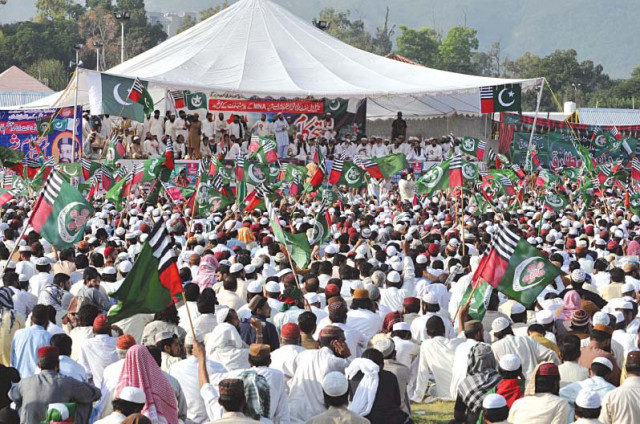Azam Tariq’s death anniversary: Aabpara ‘under siege’, as banned outfit convenes
In a bid to accommodate the participants of the rally, panic-stricken city administration forgets the residents.

Hundreds of activists of Ahle Sunnat wal Jama’at, a new face of the banned extremist sectarian outfit, Sipah-e-Sahaba Pakistan (SSP), on Thursday held the oldest and one of the busiest business districts of the capital city hostage for an entire day.
In a hustle to accommodate the participants of the rally, who had come to commemorate the death anniversary of their slain leader, Maulana Azam Tariq who was gunned down on the outskirts of the capital in 2003, the panic-stricken administration blocked all the roads leading to Aabpara and even the nearby streets.
The rally was held at the Aabpara Community Centre near the commercial hub where thousands of residents from the twin cities come for their businesses, jobs and shopping.
The area around the venue of the rally was cordoned off by erecting makeshift fences and jersey barriers diverting traffic to narrow lanes and streets in G-6. It appeared the administration catered too well to the needs and security of the participants of the rally and forgot the residents and the commuters.
Multiple entry and exit routes, guarded by police officials and walk-through gates were provided to the participants of the convention. However, a shrine nearby and its people, were left unguarded. Some of the participants of the rally chanted slogans at the shrine while passing by it on their way back.
The administration did not open the roads and streets until the last of the participants left the venue and the nearby Aabpara Market.
The common man continues to suffer
In the morning people found it very difficult to reach their offices on time as all the traffic was badly disturbed and the ordeal continued throughout the day.
“Life has become very difficult for the common man in Pakistan. Every morning we wake up with a new obstacle to overcome, with a new challenge, there is always a worry whether we’ll be able to make it to our destination or not,” said Tariq Shah, a passerby while talking to The Express Tribune.
A family that had come from Azad Kashmir to meet their relatives, who live near Aabpara, faced a lot of difficulty to reach there.
“We were asked to park our car on Kashmir Highway by the police. I was forced to get a wheelchair for my old mother, so that she could be cross the road,” said Kamran.
Sanaullah, a corn vendor, struggled to make a single sale. “My house runs on my daily earning, I won’t be able to provide for them today I guess,” he said.
Shafiq, a shopkeeper had similar worries as no one had visited his shop since morning.
“Load shedding and sky rocketing inflation have already rattled our businesses and now such events are making it worst,” he said.
“When I arrived in the morning I saw these hurdles (pointing to concrete blocks) and the road to my office was blocked,” said Muhammad Mustafa who had to park his car several kilometers away from his office situated on the Khayaban-e-Suharwardy, the road on which main Aabpara is located.
Mustafa was one of many such commuters who had to park their cars at the traffic junction adjacent to 7th Avenue as the police had blocked the main road with concrete blocks and the link road with moveable barriers.
“I have taken three circles of this area. Every street leading to my office place was blocked. Now he (the constable) is asking me go the same way back while my office is just there in front of me,” said Muhammad Hasnat pointing towards his office across the barrier.
Kept in oblivion
People complained they were not informed of the blockade of routes and the security arrangements through media or any other means either by the police or the city administration.
“I was surprised to see my way blocked in the morning. I got late from office and remained worried for my car the whole day,” said Tabassum, who had to leave his car along one of the blocked roads.
He and his colleagues had to travel by foot from one end to the other end of the Aabpara market to get to their office.
Double the pain on CNG holiday
On three days of the week, when transport is hard to find due to CNG load shedding, stops for public transport were shifted from Aabpara Market. This made the nearby intersections congested which resulted in traffic jams throughout the day.
The shift of the bus stops coupled with the CNG load shedding made life difficult for the passengers, who not only had to fight for the limited space in public transport but had to walk extra yards to search for the makeshift stops.
Published in The Express Tribune, October 7th, 2011.



















COMMENTS
Comments are moderated and generally will be posted if they are on-topic and not abusive.
For more information, please see our Comments FAQ